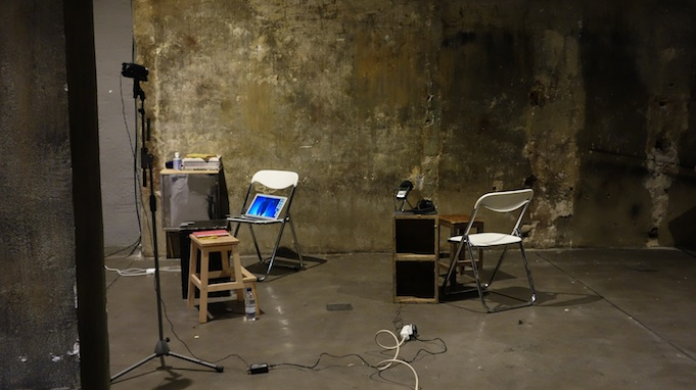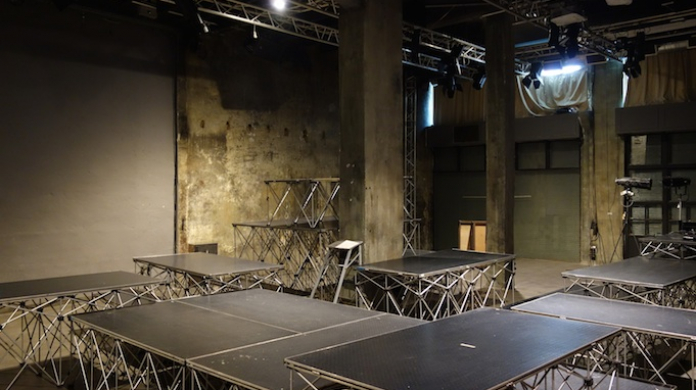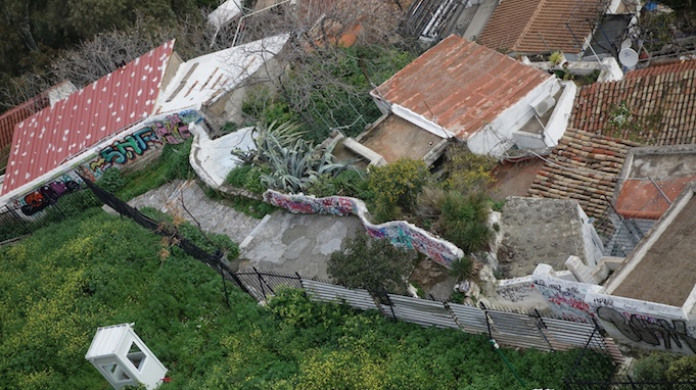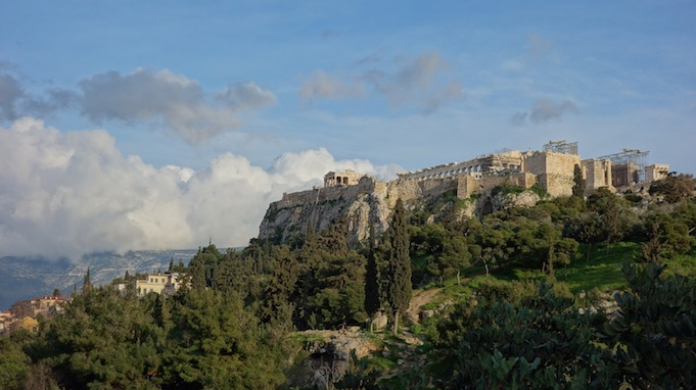Sleepdogs spent a week at Bios, Athens in March 2015 to begin work on Steady State, a new project about money. Tanuja Amarasuriya responds to Eleanor Turney’s questions about where the residency took her and Sleepdogs co-conspirator, Timothy X Atack.
The only conversation...
Tell us briefly how this project came about? What did you do? Where did you go?
It was a sort of happenstance, dovetailing of a couple of things that had been brewing for the last few years. We met Gabriella Triantafyllis from Bios at the Caravan showcase in 2012, where we showed a short piece of ours called Astronaut, which she really liked. We’ve been talking ever since about what might be the right way for Sleepdogs and Bios to collaborate on something. One of the many brilliant things about Gabriella is that she’s honest and has amazing integrity – so our conversation was never about the easiest or fastest way to make something happen; it was about finding the most interesting way to use the relationship.
Around the same time in 2012, Tim started writing a script called Steady State, exploring arguments around climate change. As he continued researching, this inevitably evolved into a story about how money moves around the world. We had nothing more than a sense of anger, and a sense of duty as artists to do something productive with that emotion. In August 2014 we pitched where we were at with Steady State to Gabriella, and that became the hook for our residency at Bios. It feels obvious now, that of course we should go to Athens to start work on a show about money, but that’s retrospect for you. Nice of Greece to call a snap election and elect a radical left government just before we went out there mind!
We were in Athens for a week, working out of the wonderfully flexible and industrial main space at Bios. We interviewed an extraordinary bunch of people from former ambassadors to neighborhood regeneration activists about their views on money. We made field recordings through the streets of Athens and created beats from them. We read out transcripts from the US congressional hearings investigating the banking crisis. We watched streams of real-time data and talked about what else it could mean. We imagined new myths of money. We thought about what the opportunity of theatre was, to explore these ideas and emotions.
What was the more surprising thing about the trip/project?
The fact that we’d taken a few years to get to know Gabriella and build a proper relationship based on trust, meant that we could take more risks with how we used the residency. Tim and I have never worked with interviews as source material before, and Gabriella set us up with some intimidatingly erudite interviewees. It definitely forced us out of our comfort zone and upped our game. It was a real privilege to listen to what those people had to say. And their openness and generosity was disarming. We never felt we were getting “political” responses, even from the politicians.
When we said we’d come to Athens to talk to people about money, one of our interviewees responded with, “Well you’ve come to the right place. It’s the only conversation here.” But what we found was that it’s actually really hard to talk only about money. The conversation inevitably shifts to different territory: politics and geo-politics, family, art, history. I guess because, of course, money doesn’t mean anything in and of itself.
From its earliest inklings, we knew Steady State had to be adamantly global in its scope. And we knew it had to acknowledge concepts and ideologies that might fight brutally with our own morals and politics. Starting our practical research in a foreign country has already had a fundamental influence. It’s like the axes of this show are angled differently all of a sudden. The interviews we do in the UK will be in relation to the ones we did in Athens rather than the other way round. As two people who grew up far from the countries of our birth, a sense of internationalism is embedded deep in both me and Tim, which influences all the art we make. It’s interesting that now the project (as well as the artists) also has diasporic roots.
What did you bring home that will form part of your practice now?
Well, it’s always good to be reminded how useful it is to be creating in an actual tech-ready working theatre space – the sort of space in which you can plug lights in, pump sound through a big PA, and play with options of relationship to an audience. It definitely helps to place the 3D theatre bit at the centre of the scriptwriting process. One of the great things about Bios is that nothing in the space is fixed. We were in residence for six days, and the space was configured three different ways whilst we were there. It really helped stay alive to how and from where an audience might relate to what we’d place on stage.
And we were trusted in the space. We could be instinctive. We didn’t have to ask permission every time we wanted to use the sound desk. And we didn’t have to show any work-in-progress or demonstrate our research publicly in any way at the end of the residency. It meant that we could experiment in a very free and unfiltered way that was hugely productive. It meant we could spend a lot of time wandering about the room simply thinking, without the pressure to make fast decisions, without even talking. It allowed us to imagine ambitious and complex layers, which might take years to articulate, without worrying about creating material that would make sense to an audience in one week.
What was the best part of the trip?
Boy oh boy those Greeks know how to cook! All through the week we were welcomed and hosted with so much respect and generosity. People seemed really proud of their city and culture – admitting where they saw societal complacency and the need for change, sure, but with warmth and pride in their culture and community. Almost everyone we interviewed referred at some point to ancient history. It was pretty extraordinary to have two intense days of talking to people about the here-and-now of Athens’s immediate situation and then climb up the Acropolis and wonder about the civic debates that happened over 2000 years ago in the Parthenon. There’s no way that kind of perspective won’t influence Steady State as it develops.
What's next?
One thing we know for sure is that we’ll need to interview more people, living in more places around the world (though I suspect we may have to rely on Skype for most of that…) We also want to embed a relationship with its immediate context into the content of the piece for touring.
There’s already lots of theatre that responds brilliantly and provocatively to the problem of money and how we deal with it. One of our big questions going into the residency was what new perspectives we could bring to the issue. We reckon we’ve found those anchors, or as Tim puts it, the "emotional ground plans" for the play: an invitation to create new myths of money, finding the points of hope in endless data – because despite what the politicians might say, those points of hope exist, and we can make them ours.
Tanuja Amarasuriya and Tim X Atack work together as Sleepdogs, and were supported in their residency by the British Council.




